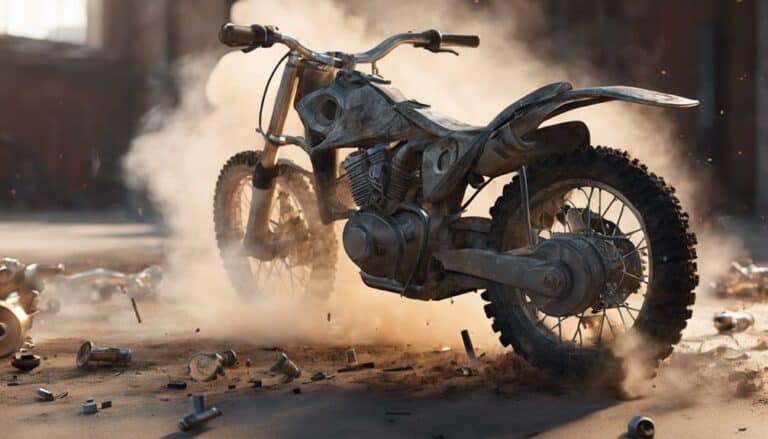When it comes to your dirt bike, using the wrong type of oil is like putting square pegs in round holes—it just won't work as intended. The repercussions of this mismatch can be far-reaching, affecting not only your engine's immediate performance but also its long-term health.
From decreased lubrication efficiency to potential overheating issues, the consequences of improper oil selection are not to be underestimated. But what exactly happens when the wrong oil meets your dirt bike's engine? Let's explore the potential outcomes in detail.
Key Takeaways
- Wrong oil causes increased friction, leading to engine damage and wear.
- Inadequate lubrication results in overheating and poor performance.
- Clutch slippage issues may arise from using the incorrect oil type.
- Long-term damage to internal parts can occur without proper oil selection.
Engine Damage From Inadequate Lubrication
Using the wrong oil in your dirt bike can lead to significant engine damage due to inadequate lubrication, causing increased friction and wear on essential components. When the wrong oil is utilized, it fails to form a proper lubricating film on engine parts, which is important for reducing friction and wear.
The viscosity of the oil is essential in ensuring that all moving parts within the engine are adequately coated and protected. Inadequate lubrication resulting from the wrong oil choice can disrupt this balance, leading to direct metal-to-metal contact and heightened friction levels. This increased friction generates heat, potentially causing overheating in the engine and damaging sensitive components.
Additionally, the compromised lubricating film can accelerate wear on essential engine parts, diminishing performance and efficiency. Ultimately, engine damage from inadequate lubrication necessitates costly repairs and part replacements, impacting the overall longevity and operational effectiveness of your dirt bike.
Proper oil selection is necessary to safeguard your engine and optimize its performance.
Increased Friction and Wear on Components
The utilization of an inappropriate oil type in your dirt bike can lead to a notable increase in friction between engine components, resulting in accelerated wear and tear on critical parts.
When considering the viscosity of the oil, using a thinner oil than recommended can lead to increased friction due to reduced cushioning between metal surfaces. Conversely, opting for a thicker oil can also exacerbate friction as it may not flow efficiently between components, causing resistance and wear.
The mismatch in viscosity properties can further contribute to overheating, intensifying the friction and hastening the degradation of engine components.
In the area of motor oil, selecting the wrong type may compromise the lubrication process, leading to metal-to-metal contact and heightened friction levels within the engine.
Overheating and Poor Performance
Improper oil selection in a dirt bike can lead to detrimental consequences such as overheating and diminished performance. When choosing engine oils, it's important to take into account factors like viscosity.
Using oil with a higher viscosity than recommended can lead to increased friction within the engine, causing excessive heat generation. This added heat can be detrimental to the proper functioning of the dirt bike's engine, potentially leading to overheating issues. Additionally, improper lubrication from the wrong type of oil can affect the smooth operation of the crankshaft journals, further contributing to poor performance.
To prevent these issues, it's essential to change the oil regularly and make sure the correct oil viscosity is used according to the manufacturer's recommendations. Neglecting this aspect can result in reduced power output, decreased acceleration, and even long-term damage to the engine.
Potential Clutch Slippage Issues
Shifting from concerns of overheating and poor performance due to improper oil selection, potential clutch slippage issues can arise in a dirt bike when using oil with friction modifiers. The presence of these modifiers can greatly impact the clutch system, leading to various problems that affect the bike's overall performance. Here are some key points to take into account:
- Using oil with friction modifiers can reduce clutch grip, causing slipping during acceleration.
- Clutch slippage can result in power loss and diminished performance in your dirt bike.
- Inappropriate oil choices with additives may compromise the clutch system's engagement and disengagement.
- The wrong type of oil can create excessive friction on the clutch plates, leading to premature wear and potential failure.
It is crucial to select the right type of oil for your dirt bike to make sure excellent performance and longevity of the clutch system. Be mindful of the presence of friction modifiers and their potential impact on clutch operation to prevent issues like slipping and premature wear.
Long-Term Damage to Internal Parts
Using the incorrect oil in your dirt bike can gradually lead to extensive wear and damage to its internal engine components over time. When the wrong, typically thinner oil is used, it fails to provide adequate lubrication for the internal components, resulting in increased friction and heat. This lack of important lubrication can lead to metal-to-metal contact, causing premature wear on critical parts such as bearings, pistons, and cylinders.
The viscosity rating of the oil plays a significant role in ensuring proper lubrication within the internal combustion engine. Over time, the continued use of the wrong oil can deteriorate the engine's performance, efficiency, and overall reliability. To mitigate potential long-term damage, it's essential to use the correct oil recommended by the manufacturer for your dirt bike.
Regularly changing the oil with the appropriate type and maintaining the recommended oil change intervals can help preserve the internal parts of your dirt bike and prevent costly repairs in the future.
Conclusion
To sum up, using the wrong type of oil in your dirt bike is like playing with fire – it can lead to catastrophic consequences. From engine damage to increased friction and overheating, the risks are significant.
It's essential to adhere to manufacturer guidelines and use the recommended oil to guarantee peak performance and longevity of your bike. Remember, it's better to be safe than sorry when it comes to maintaining your dirt bike's engine health.

